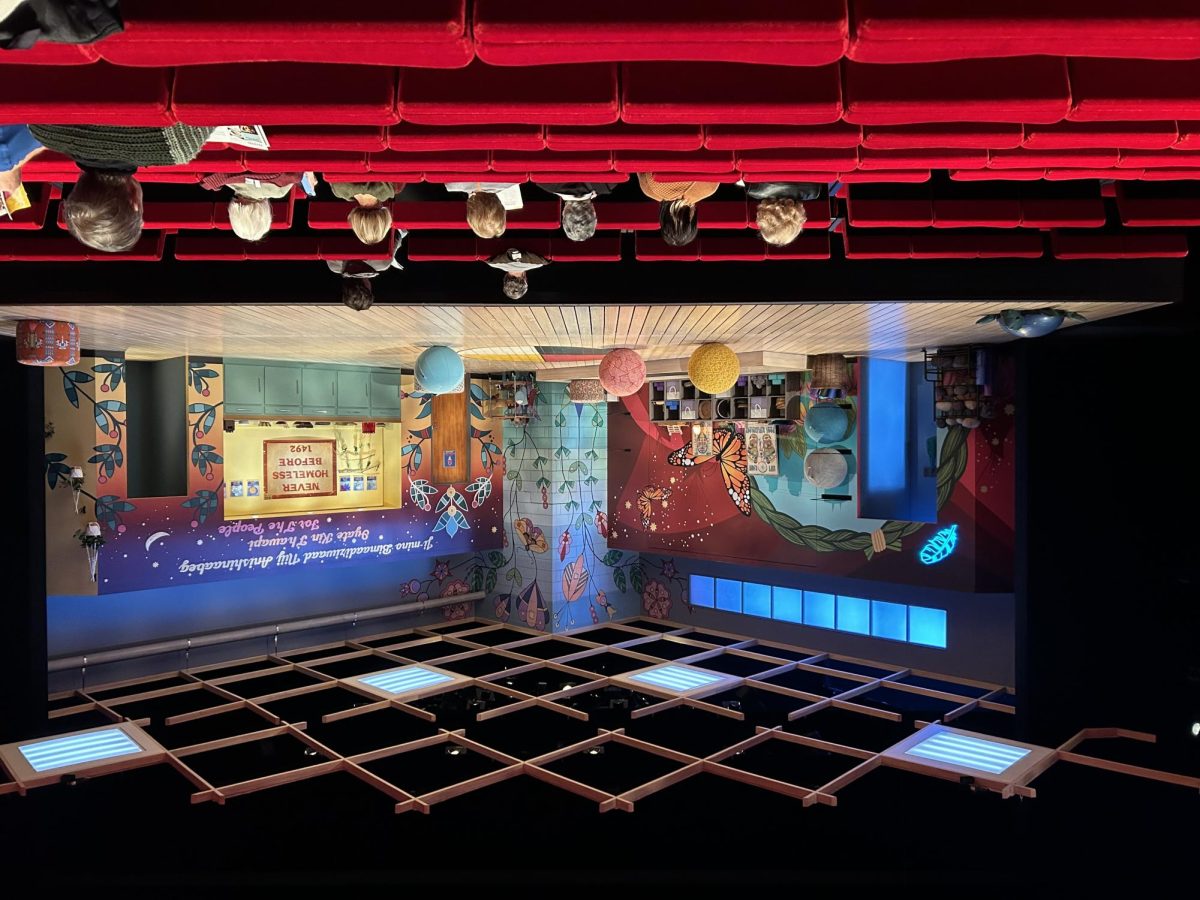On the evening of Tuesday, Oct. 10, a group of about 40 Carleton students made the journey to Minneapolis for a night at the theater. The participants included largely students taking either “Drama, Film, and Society” and “Banned. Censored. Reviled,” both taught by associate professor of English Pierre Hecker, as well as other students involved in the English and theater departments.
Once the group arrived and made it into the McGuire Proscenium, they found a unique set featuring yoga mats, exercise balls and other equipment, as well as an Ojibwe phrase printed on the wall and, ending with the English words, “For The People.” Trip participants did not receive context on what the play was about prior to the trip beyond information in the program about the emphasis on Indigenous voices. Claire Sniffen ‘26, a student in “Banned. Censored. Reviled,” said she “thought the set was really good.” Throughout the show, the initially simplistic set revealed hidden tricks, such as a wrecking ball and broken lights during a post-demolition scene, and a complex rain/filter stage mechanic at a pivotal moment in the show.
“For the People” started at 7:30 p.m. This particular showing was the second preview. Two cast members were in new roles. In an eight-person cast, not every member had a dedicated understudy. For some viewers, this affected the production: Polly Murray ‘27, from “Drama, Film, and Society,” said they “didn’t like it because it seemed like the cast was unprepared. Two cast members were holding scripts.”
Sniffen also said, however, that “there were moments when you could tell that the actors weren’t confident in their lines, but I don’t think it detracted from the story overall.” There was a general consensus among the attending classes that the issues had the potential to be resolved in the first few weeks of the play’s run, as continued performances and practice may make actors more confident.
“For the People” focused primarily on the relationship between April Dakota, a young Indigenous woman who seeks to open a wellness center in Minneapolis, and her father and how their different goals and visions for the Indigenous community of Minneapolis affected that relationship. The play made a clear point about the dangers of gentrification. It also made nuanced contributions to the discussion about what qualifies a person as Indigenous, touching on issues of DNA and culture and the difference between growing up on a reservation or in a city. Murray, who is from St. Paul, said, “The story had a lot of potential — the topic of gentrification, especially because it’s so close to home, is really important. I’m glad that Indigenous voices are being broadcast at The Guthrie.”
Beyond the political messages, the play spent a lot of time developing relationships. April and her father’s relationship evolved, and the transformation of April’s relationship with Sage — a young Indigenous person who more closely adheres to tradition — is emphasized near the end. Sniffen opined, “It was a little bit cheesy and cliché. Overall it was sweet and had a good message.”
Murray said that a key component of the play was that while the cast is small, the community that contributed to this play is a lot bigger. In the program’s welcome note, Guthrie Artistic Director Joseph Haj explains the play, saying, “‘For the People’ was born from the experiences of the Twin Cities Native community, many of whom shared stories at talking circles and helped hone the play at workshops over the past several years.” All the actors playing Indigenous roles were Indigenous and all are having their Guthrie debut with this show — an opportunity that wouldn’t have been possible without the Guthrie’s Native Advisory Council and the Artistic Director’s mindfulness.
Since this was the second preview of an entirely new show, Professor Hecker said that he couldn’t be entirely sure how much it would connect to the themes of his two classes.
Sniffen said that “it related to [‘Banned. Censored. Reviled.’] in the sense that Indigenous stories haven’t really found a place in popular theater before. It was certainly my first time watching a play by an Indigenous playwright about Indigenous experiences, which I think relates to the censorship theme.”
Murray commented that “The play fit into the society component of ‘Drama, Film, and Society’ since there was a lot of riveting intergenerational discussion between characters that revealed a lot about different perspectives in the Indigenous community.”
The 42 students who went to the play are not the only Carleton students who had the opportunity to see “For the People”: the Office of Intercultural Life (OIL) is sponsoring a trip to see the show this Saturday, Oct. 21.










